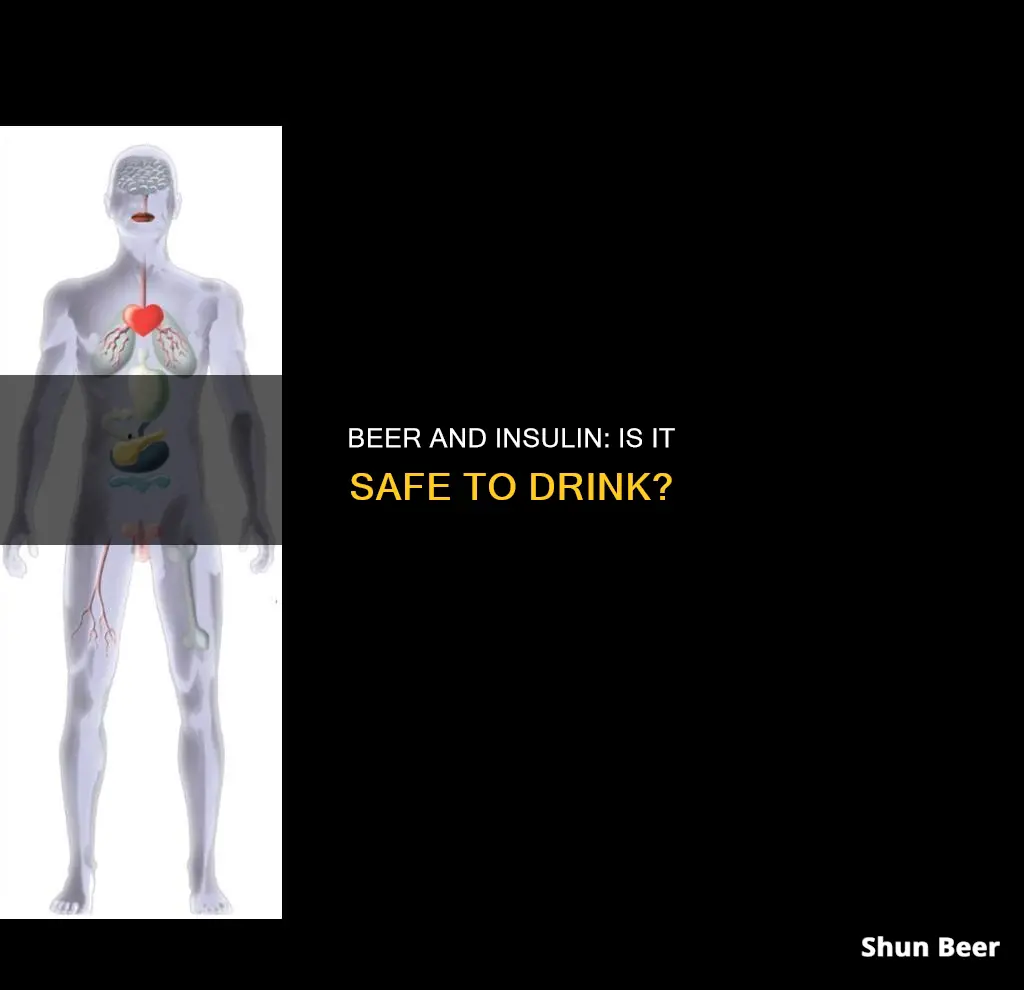
People with diabetes do not need to abstain from alcohol entirely, but there are some important safety considerations to keep in mind. Alcohol can cause blood sugar levels to drop, increasing the risk of hypoglycemia, especially if the person has not eaten. Alcohol does not directly interact with insulin, but it complicates diabetes management by increasing the risk of hypoglycemia and masking its symptoms. Therefore, it is important to monitor blood sugar levels before, during, and after drinking, and to drink in moderation.
| Characteristics | Values |
|---|---|
| Can people with diabetes drink beer? | Yes, but in moderation and with caution. |
| How does beer impact blood sugar levels? | Beer is a significant source of carbohydrates, so it can impact blood sugar. |
| What are the risks of drinking beer with diabetes? | Drinking beer can cause hypoglycemia, or low blood sugar, as the liver is busy clearing alcohol from the body and may be delayed in releasing necessary sugars into the bloodstream. |
| What are the symptoms of low blood sugar? | Feeling dizzy or lightheaded, loss of consciousness, confusion, headache, irregular heartbeat, anxiety, seizures. |
| What are the recommendations for drinking with diabetes? | It is recommended to drink in moderation, not on an empty stomach, and to monitor blood sugar levels before, during, and after drinking. |
| What are the best alcoholic beverages for people with diabetes? | Red wine, dry white wine, distilled spirits (gin, tequila, vodka, whiskey), low-carb cocktails. |
What You'll Learn

Alcohol lowers blood sugar, increasing the risk of hypoglycemia
The risk of hypoglycemia is particularly high for people with diabetes who are taking insulin or other diabetes medications. Alcohol can interfere with the effects of these medications, making it harder to manage blood sugar levels. Additionally, the symptoms of hypoglycemia, such as confusion, dizziness, and drowsiness, can be similar to the symptoms of alcohol intoxication, making it difficult to distinguish between the two conditions. This is especially true if you have hypoglycemia unawareness, a condition in which you don't recognise the signs of low blood sugar.
To reduce the risk of alcohol-induced hypoglycemia, it is important to follow certain safety guidelines. Firstly, never drink on an empty stomach. Alcohol can impair your blood sugar levels for several hours, so it is crucial to eat before and while consuming alcohol. It is also important to monitor your blood sugar levels before, during, and after drinking, as the effects of alcohol on blood sugar can last up to 24 hours. Choosing your drinks wisely and drinking slowly can also help mitigate the risk of hypoglycemia.
It is important to note that the effects of alcohol on blood sugar are complex and can vary depending on various factors, including overall health status, nutrition, and drinking habits. Therefore, it is always best to consult with your healthcare provider to determine a safe and individualised approach to alcohol consumption, especially if you have diabetes or are taking insulin.
Drinking Six to Eight Beers Daily: Is It Safe?
You may want to see also

Alcohol interferes with the liver's ability to regulate blood sugar
Alcohol can interfere with the liver's ability to regulate blood sugar. The liver is responsible for clearing alcohol from the body, and when a person consumes alcohol, the liver prioritises breaking it down over releasing glucose into the bloodstream. This can lead to hypoglycaemia, or low blood sugar. The risk of hypoglycaemia is particularly high for people with diabetes, especially if they are also taking insulin or medications that increase insulin production.
The liver typically breaks down one standard alcoholic drink per hour. However, if a person consumes more alcohol than this, the excess alcohol will remain in their body and continue to affect them for several hours. This means that even if a person stops drinking in the evening, they may still experience hypoglycaemia overnight.
Symptoms of hypoglycaemia include:
- Sweating
- Shakiness
- Hunger
- Irritability
- Confusion
- Dizziness
- Loss of consciousness
These symptoms are similar to those of intoxication, so it can be difficult to tell whether someone is experiencing hypoglycaemia or is drunk. This makes it especially important for people with diabetes to monitor their blood sugar levels when drinking alcohol.
Cats and Root Beer: Is It Safe for Them to Drink?
You may want to see also

Drinking guidelines for people with diabetes
If you have diabetes, drinking alcohol can impact your blood sugar levels, increase your appetite, and reduce your medication's effectiveness. Alcohol can cause your blood sugar to drop very low, which is known as hypoglycemia. It can also affect your body's ability to regulate blood sugar, especially if you haven't eaten enough. Therefore, it is important to drink in moderation and only when your diabetes and blood sugar levels are well managed. Here are some guidelines to help you drink safely if you have diabetes:
- Consult your doctor: Talk to your doctor to understand if drinking alcohol is safe for you and get guidelines based on your specific health concerns.
- Drink in moderation: Do not drink more than one drink per day if you are a woman or two drinks per day if you are a man. Excessive drinking can increase your risk of chronic diseases such as heart disease, liver disease, and kidney disease.
- Don't drink on an empty stomach: Always have food in your stomach when drinking alcohol. Food slows down the absorption of alcohol and raises blood sugar levels, reducing the risk of hypoglycemia.
- Choose your drinks wisely: Opt for drinks that are low in sugar and carbohydrates. Avoid sweet wines, sugary mixers, and drinks with added juice or soda. Instead, choose liquor mixed with club soda, water, or diet soda, dry wine, or low-carb beer.
- Monitor your blood sugar levels: Check your blood sugar levels before, during, and after drinking. This will help you manage your diabetes and avoid hypoglycemia.
- Wear a medical alert ID: Wear jewellery or carry identification stating that you have diabetes. This will help ensure you get the right medical assistance in case of an emergency.
- Be mindful of symptoms: The symptoms of hypoglycemia, such as dizziness, confusion, and headache, can be similar to the symptoms of intoxication. Be aware of these symptoms and inform those around you so they can help if needed.
- Stay hydrated: Drink plenty of water along with your alcoholic beverage to stay hydrated and reduce the risk of alcohol-related dehydration.
- Avoid drinking if your blood sugar is low: If your blood sugar levels are already low, avoid drinking alcohol as it can further decrease your blood sugar.
Beer After Cycling: What's the Harm?
You may want to see also

Alcohol may reduce the effectiveness of diabetes medication
Additionally, alcohol can affect your body's ability to regulate blood sugar by making it drop, especially if you haven't eaten enough. If you drink alcohol on an empty stomach, your blood sugar may continue to drop, increasing the risk of hypoglycemia. This is why it's important to never drink on an empty stomach and to always eat while consuming alcohol.
Alcohol can also interfere with the positive effects of oral diabetes medications or insulin. It can keep your liver from turning proteins and fats into carbohydrates when your body needs energy, such as during exercise or between meals. This can make it difficult for your body to maintain stable blood sugar levels and may lead to a hypoglycemic episode.
Furthermore, the symptoms of hypoglycemia, such as confusion, dizziness, irritability, headache, and fatigue, can be similar to the symptoms of intoxication. This means that if you are drinking alcohol and your blood sugar drops, you may not realise that you need insulin because you may think that you are just drunk. This can be dangerous, as you may not get the medical attention you need.
Therefore, if you have diabetes and choose to drink alcohol, it is important to be very aware of how it can affect you and to monitor your blood sugar levels before, during, and after drinking. It is also important to discuss alcohol consumption with your doctor to ensure that it is safe for you and will not interfere with your medication.
Beer and Probiotics: A Healthy Mix?
You may want to see also

Symptoms of hypoglycemia and how to treat them
While drinking alcohol in moderation is generally safe for people with diabetes, drinking excessively can cause blood sugar levels to drop, increasing the risk of hypoglycemia. Hypoglycemia, or low blood sugar, can lead to severe health complications and even become life-threatening if left untreated. Here are some detailed symptoms of hypoglycemia and ways to treat them:
Symptoms of Hypoglycemia
- Nervousness or anxiety
- Sweating, chills, and clamminess
- Irritability or impatience
- Feeling lightheaded or dizzy
- Loss of colour in the skin (pallor)
- Weakness or lack of energy
- Blurred or impaired vision
- Tingling or numbness in the lips, tongue, or cheeks
- Coordination problems or clumsiness
- Nightmares or crying out during sleep
- Thumping heart
- Confusion
- Slurred speech
- Numbness
- Drowsiness
- Seizures
- Coma
How to Treat Hypoglycemia
- The "15-15 Rule": Consume 15 grams of carbohydrates to raise your blood glucose and check it after 15 minutes. Repeat this process until your blood glucose reaches at least 70 mg/dL. Examples of foods with 15 grams of carbohydrates include glucose tablets, gel tubes, 4 ounces of juice or regular soda, and hard candies.
- Glucagon: If hypoglycemia is severe and cannot be treated with the 15-15 Rule, Glucagon can be used. It is a prescription medication that stimulates the liver to release stored glucose. It can be injected into the buttock, arm, or thigh, or administered through the nostril.
- Medical Alert: Wear a medical alert ID that states you have diabetes, so that people around you can recognise the symptoms of hypoglycemia and help you seek medical attention if needed.
- Regular Monitoring: Keep checking your blood glucose levels regularly, especially before and after meals and exercise, to prevent hypoglycemia and manage your diabetes effectively.
High Blood Pressure and Beer: Is It Safe?
You may want to see also
Frequently asked questions
Yes, you can drink beer if you have diabetes, but it's not without risks. Beer is a significant source of carbohydrates, so it can impact your blood sugar. It's best to know how to drink safely to keep your blood sugar in a healthy range.
Drinking alcohol can cause hypoglycemia, or low blood sugar. This happens because your liver, where glucose is stored, is also responsible for clearing alcohol from your system, so it may be delayed in releasing necessary sugars into the bloodstream.
Drinking beer can affect your blood sugar levels, so you need to limit your intake to what is safe for you by knowing your own limits. Beer is typically higher in carbs than other alcoholic drinks, so drinking beer may contribute to weight gain over time.
If you want to drink beer with diabetes, it's important to drink in moderation, never on an empty stomach, and to keep close tabs on your blood sugar levels before, during, and after drinking. It's also a good idea to wear a medical alert ID that states you have diabetes, and to inform the people you are with so they can get help if needed.







